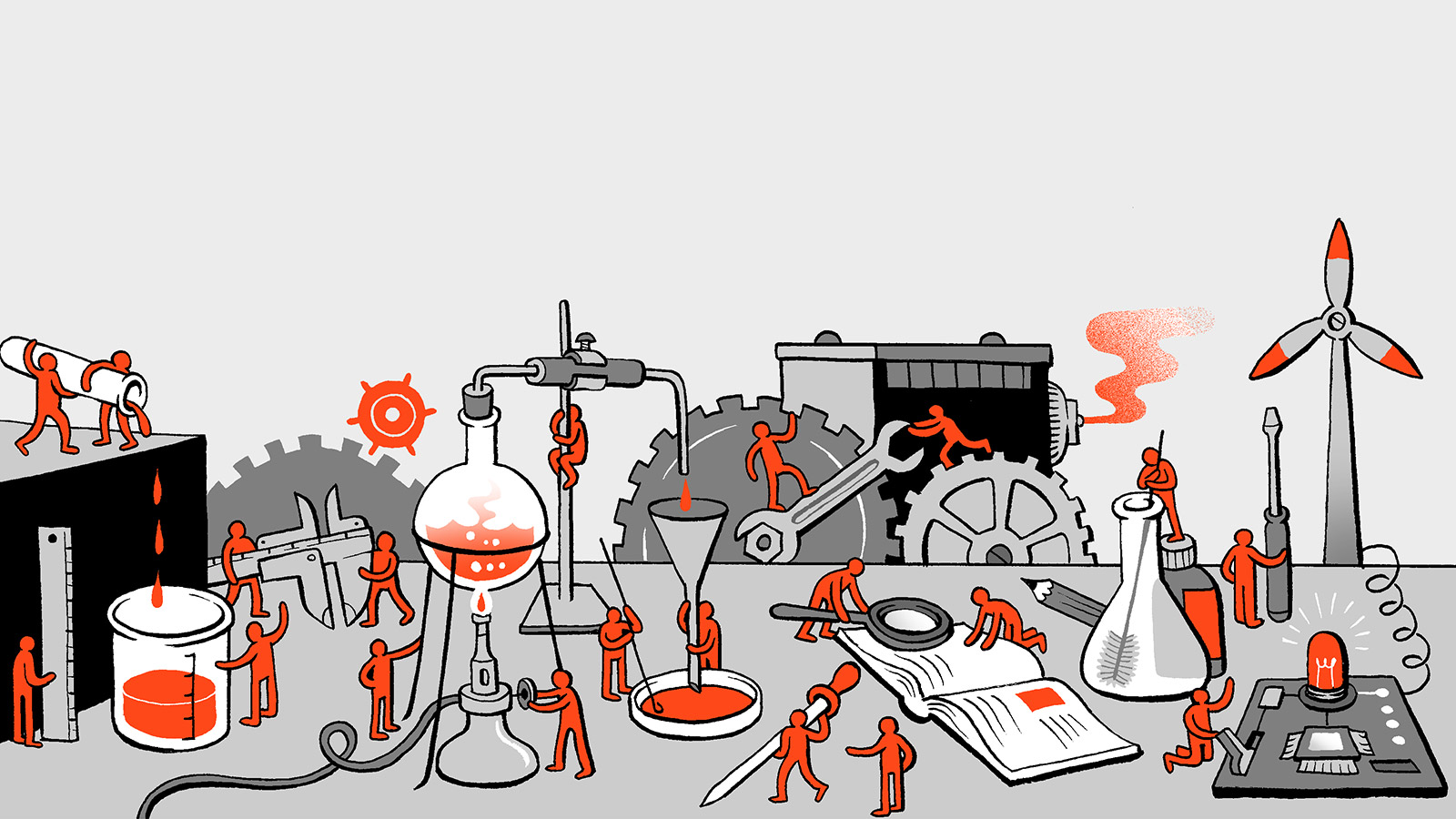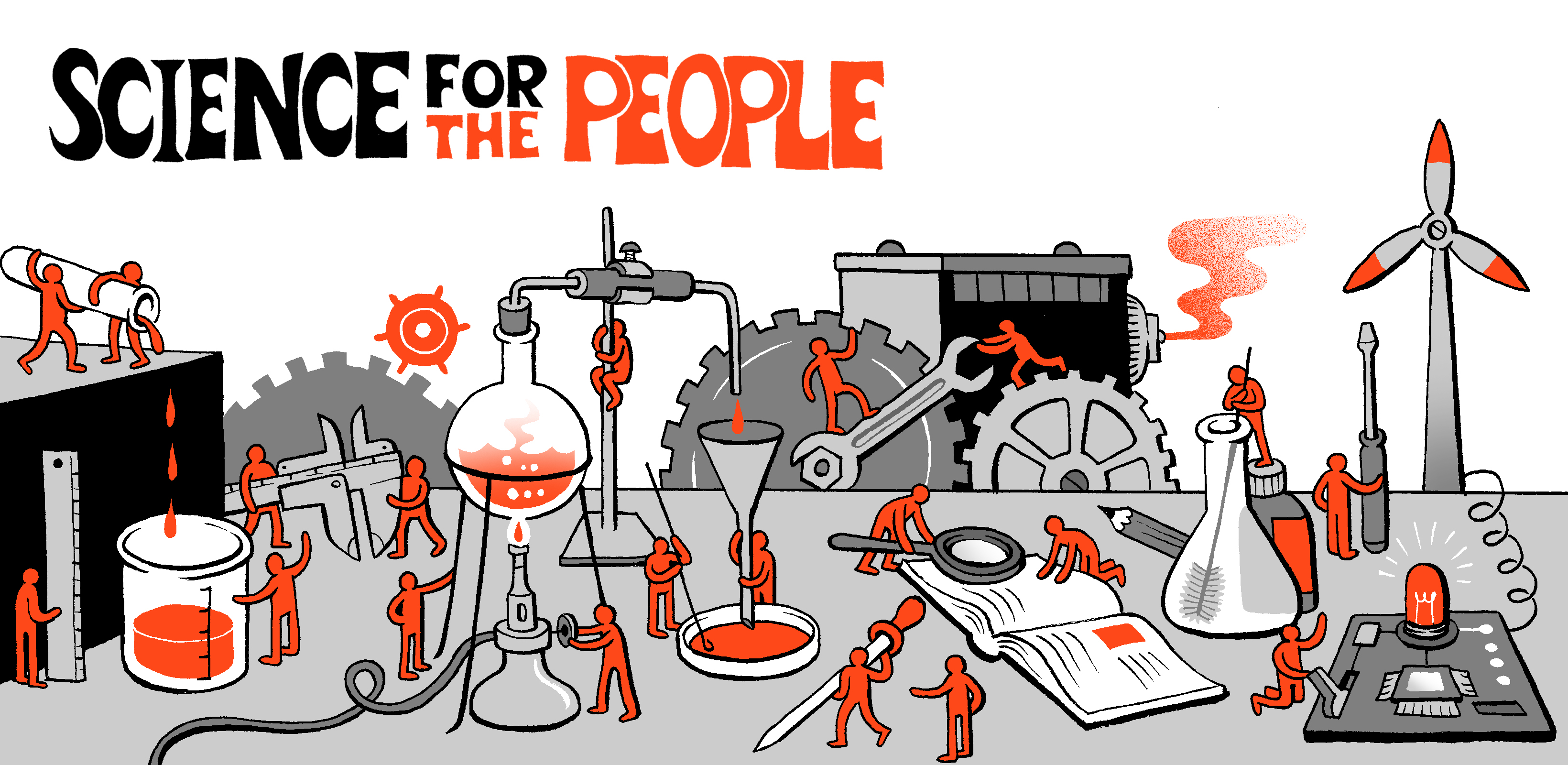Winter 2022/23 Organizing Reports
Volume 25, no. 3, Killing in the Name Of
You can find previous organizing reports here. Contact secretary@sciencefothepeople.org to get involved!
Anti-militarism Working Group
This is an edited excerpt from SftP’s presentation at the Socialism 2022 conference.
I’m part of the Anti-militarism Working Group. This work was especially important to me, because as someone who worked on machine learning for my day job, I saw so many machine learning applications being created and used by the military. Even seemingly innocuous examples I felt would be ultimately tainted by military applications. I was working on image recognition and my boss told me about a new breakthrough that was being developed by some other organization. The idea was to help find people who were missing in forests, using drones. You just train the algorithm to ignore large portions of green. Great! Who doesn’t want to help find missing people? But you know who else is in the forests? Indigenous people. Anyone resisting colonialism. There was absolutely no way that this technology wouldn’t be used for that.
Finding SftP gave me hope that there were other scientists who were thinking about these exact same problems. The Anti-militarism Working Group had done counter-recruitment campaigns at STEM job fairs on college campuses. Anyone in science knows that some of the largest grants are from the Department of Defense. At my university, I learned that most of the Psychology department’s funding for suicide prevention research came from the Department of Defense (DoD). That’s fucked up, right? Why doesn’t the National Institutes of Mental Health provide this finding? Why don’t they have the funding to do this? It’s absolutely ridiculous. But my point is that the DoD is the largest, most reliable source of funding for scientists. More than the National Science Foundation, more than the National Institutes of Health. If you have a contract with the DoD, you’re set as an academic. So, SftP would hand out flyers to students at these job fairs, where Raytheon is trying to recruit people, explaining what these jobs entail, showing who’s impacted by this technology, and saying why they shouldn’t be contributing to this.
And let me tell you, as a scientist, this is really hard to hear sometimes. I was talking to a chemistry PhD candidate at my local socialist meeting recently, and they told me they would take whatever job at whatever company because they need to survive. I don’t blame them. This is the world we live in. But I will say, as a scientist, sometimes it’s easier to hear why we shouldn’t succumb to capitalist and imperialist pressures from other scientists.
That was the start of the Anti-militarism Working Group. As we regrouped in 2021, the bombings in Gaza started again. We all agreed that the new direction of the Anti-militarism Working Group had to be focused on Palestinian solidarity. So we started a STEM for Palestine coalition. We reached out to a bunch of Palestinian activist groups, such as the Palestinian Youth Movement and the National BDS Committee, and Palestinian science groups, such as Scientists for Palestine. We also reached out to other STEM activist groups.
Our big question was: What do we do? We had a bunch of different ideas. We wanted to trace the grant funding that STEM academics receive, and call out military contracts, including those related to supporting apartheid. We also wanted to educate scientists about the occupation and ethnic cleansing happening in Palestine. We were trying to figure out where to focus our energies. Then the No Tech for Apartheid movement happened. Google and Amazon signed a $1.2 billion contract with the Israeli government. It was revealed in the Intercept that much of this technology was going to be image recognition software. Documents showed that the new cloud would give Israel capabilities for facial detection, automated image categorization, object tracking, and even sentiment analysis that claims to assess the emotional content of pictures, speech, and writing. We know that Palestinians are one of, if not the most, heavily surveilled communities in the world.
Now our focus is supporting this campaign. We met with the Dissenters to learn from their successful campaign in Chicago as well as members from Durham 2 Palestine, a coalition based in Durham, North Carolina. Durham has actually been a phenomenal force in Palestinian activism. Durham was the first city in the country to end the “deadly exchange,” where city governments send their police forces to train with the Israeli army and teach each other deadly tactics. In 2018, Durham 2 Palestine successfully campaigned to end this exchange. Now we have Google and Facebook opening up headquarters in the Research Triangle. D2P is planning to coordinate a No Tech for Apartheid movement by reaching out to new Googlers and convincing them to petition this contract, and end Tech for Apartheid.
And if any of you have been following the news about the No Tech For Apartheid campaign, you’ll know that Ariel Koren, the Google employee who first called out Google for its contract with an apartheid state, just quit because of the retaliation and discrimination she faced for supporting Palestinian rights. And I think this is also where SftP really makes an impact as an organization. I mentioned that it’s hard to hear about anti-militarism as a scientist. It makes you feel hopeless and alone.
This feeling is amplified when you’re defending Palestine. There’s this website, Canary Mission, which blacklists activists who speak up for Palestine and smears them as antisemitic. Palestine Legal, a legal services organization which defends the free speech of students and activists, told SftP that Canary Mission has specifically started targeting medical school students, and Palestinian activists are being denied interviews because of their support for human rights. Palestinian Youth Movement told SftP that helping students know there are other scientists out there who are defending Palestine helps them feel less alone. SftP is about community. It’s about building a support system.
New York City
SftP NYC is engaged in a host of political activities, straddling tactics that cover the gamut of direct action, political education, and priority campaigns. The chapter was founded during the revival of SftP in 2018. This report, however, will focus on chapter activity from 2020 onward.
During the pandemic, members of the chapters brought out their bikes and plugged into mutual aid efforts to bring essential items to vulnerable community members with a local non-profit called Invisible Hands. In parallel, a reading group composed of chapter members and members of Democratic Socialists of America’s Ecosocialist Working Group met virtually and discussed Thea Riofrancos’s Resource Radicals. As COVID-19 spikes began to subside, members met in Brooklyn in person to discuss strategies for identifying and building targeted, sustained campaigns. In October 2021, we brainstormed about what radical science meant, which materialized into an introductory article about SftP in the French Canadian magazine À bâbord! In March 2022, around fifteen members joined another in-person planning meeting to pursue long-term climate justice struggles.
Chapter members have continued to maintain a sustained presence at public events organized by allied groups and affiliate organizations such as the May Day March. We immersed ourselves in the energy of mass gatherings to connect with other leftist groups and leaders within the labor movement. A few members also participated in a protest organized by No Tech for Apartheid in front of Google’s Manhattan offices to demand the end to Project Nimbus. These activities have allowed members to move beyond theoretical considerations and become active participants in contemporary struggles.
In addition to supporting allied organizations, we and a few members from the publication committee partnered with The People’s Forum in August 2022 to screen and discuss the documentary Ants and the Grasshopper. We invited the director Raj Patel to speak about capitalist agriculture and international resistance. This first organized in-person event at The People’s Forum since the pandemic was extremely energizing, allowing chapter members to strengthen relationships with one another as well as with other activists in NYC. Currently, we are co-sponsoring The People’s Forum’s political education series Science Against Capitalism, which has been attracting a wide audience.
Another outreach event was held in July 2022 for postdoctoral scholars in Columbia University that led to a fruitful discussion about radical science amongst the dozen attendees and generated interest for strengthening the magazine’s editorial and art collectives. In January 2023, we will have hosted a book talk for Organize the Lab, inviting book contributors, SftP NYC members, as well as educators at The People’s Forum to meet in one room. An upcoming virtual outreach event, in collaboration with Index Space is planned for February 2023, to celebrate the release of the artist’s book by chapter member Andres Chang, A New Plan to Capture Greenhouse Gas. We hope the book launch event would solidify our commitment to climate activism.
Perhaps one of the most crucial climate campaigns we are currently involved in is the defense of Local Law 97 in NYC. This forward-facing piece of legislation, passed by the city council in 2019, aims at cutting down emissions from buildings in the interest of sustainability. Buildings within this city are the greatest source of emissions, contributing to two thirds of greenhouse gasses. As expected, the law has been opposed by real estate firms, leading to the lack of enforcement as well as retraction of political support by elected officials. We are ready to wage a sustained defense of Local Law 79 through advocating beyond institutional channels provided by the city council. We plan on using our expertise as scientists and engineers to unpack the technical stipulations of the law, especially those prone to manipulation by real estate companies and non-allied politicians for the explicit purpose of diluting the impact of the legislation. We will identify individuals and parties that must be held accountable for manipulating their way out of compliance. We are also preparing to engage in outreach specifically to demystify this legislation with the support of local unions. Given the clear link between climate activism and the labor struggle in this initiative, we as scientific workers have an important role to play in both.
Ann Arbor
Since our last report, the chapter has deepened involvement in coalition work with Graduate Employees’ Organization (GEO), the graduate workers union at the University of Michigan. We previously organized a joint panel, titled “STEM Careers for the Common Good,” held in spring 2021. The panel touched on career trajectories for grad workers in STEM departments, and the political and ethical challenges across the range of these careers. After this successful event, the Ann Arbor chapter and GEO collaborated on a broader panel around questions of labor and organizing researchers in STEM. Attendees from various STEM departments at the University of Michigan attended this new panel. Between forty and fifty people joined, including, importantly, veteran organizers of the GEO campaign of 2011. These organizers led an effort to register over a thousand graduate student research assistants (GSRA) for unionization. However, these efforts were blocked by then Michigan Governor Snyder’s administration in collaboration with the Mackinac Center, a prominent right-wing think tank in the state. Despite Snyder’s departure, the GSRA union is still banned by state law. This setback was much discussed and reflected during the panel. In addition, the event also focused on dispelling the stereotype of STEM being apolitical. The post-panel breakout sessions on cross-union solidarity further galvanized graduate worker organizing.
Beyond the university, our chapter has also been involved with Ann Arbor for Public Power (A2P2), a local grassroots campaign for public-owned electricity in Ann Arbor. We held a few chapter meetings as watch parties for the A2P2 public town hall events, and invited A2P2 organizers to our meetings. Our chapter is interested in replicating #TakeBackTheGrid, a Boston campaign for solidarity with public power and energy democracy, of which the Boston chapter of Science for the People was a coalition partner.
Southern Africa
Preparations for the launch of the SftP Southern Africa are advancing, and the core organizing collective is satisfied with our progress thus far. The region of Southern Africa is marked by a history of colonial territorial segmentation, persistent post-colonial segregation, and neo-colonial dispensations.
Our call to the chapter launch therefore embraces Botswana, Lesotho, Mozambique, Namibia, and Zimbabwe, along with South Africa. It is our conviction that adopting such an approach affirms our stance against xenophobia by recognizing our collective histories and interdependencies. For example, many mine workers are taken from their home countries, work in South Africa and are sent back after their bodies are no longer able to be exploited for profit.
We are having discussions with scientist-activists to gauge the level of interest, how we may organize ourselves, and how we may be most effective in local and broader struggles. Thus far, we have 85 members on our Facebook page and 45 people who have registered an interest, 30 of whom are keen to join or start a subchapter—and these numbers continue to grow. The biggest interest people have registered is on soil, water, and food security; the second is mining; and third is how SftP can complement their current organizing activity.
We would like to see our chapter develop a “People’s Science Program,” which will identify priority research areas that tackle specific problems in Southern Africa. The Program will implement participatory democracy in science research and its application as well as radical science education.
As we plan toward the chapter launch, we have been overtaken by the tailings disaster at the mining town of Jagersfontein. The mining company and the government have failed the Jagersfontein community. SftP Southern Africa sent a message of solidarity to the community on the occasion of their protest action and we listened to them, along with civil society groups, to see what we could do to support them. As a result of these conversations, we have decided to raise awareness and solidarity in aid to their upcoming legal action.
Our region has a history of extractive industries, rooted in colonial exploitation of the people, land, and resources. It is time we stop the destruction of the environment, people, and land, and start being custodians of our places. We must ensure equitable access to clean water, health care, food, and lives free from fear and full of love. As one young community monitor explained, “the land does not belong to us, we belong to the land.” We hope that SftP Southern Africa can help reach this goal.




